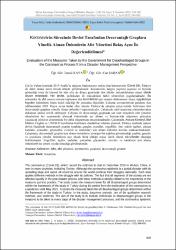| dc.contributor.author | Kaya, İsmail | |
| dc.contributor.author | Şahan, Can | |
| dc.date.accessioned | 2023-09-05T05:41:14Z | |
| dc.date.available | 2023-09-05T05:41:14Z | |
| dc.date.issued | 27.06.2022 | en_US |
| dc.identifier.citation | Kaya, İ. & Şahan, C. (2022). Koronavirüs Sürecinde Devlet Tarafından Dezavantajlı Gruplara Yönelik Alınan Önlemlerin Afet Yönetimi Bakış Açısı İle Değerlendirilmesi . Afyon Kocatepe Üniversitesi Sosyal Bilimler Dergisi , 24 (2) , 646-668 . DOI: 10.32709/akusosbil.1008217 | en_US |
| dc.identifier.uri | https://dergipark.org.tr/tr/pub/akusosbil/issue/70527/1008217 | |
| dc.identifier.uri | https://hdl.handle.net/11630/10610 | |
| dc.description.abstract | Çin’in Vuhan kentinde 2019 Aralık’ta salgının başlamasına neden olan koronavirüs (Covid-19), Türkiye
de dâhil olmak üzere birçok ülkede görülmektedir. Koronavirüs salgını yayılma aşaması ve hızında
gösterdiği ivme ile küresel bir afet olsa da dünya genelinde tüm ülkeler mücadelelerine ulusal olarak
devam etmektedir. Her devlet, politikaları ile mücadelede farklı yöntemleri uygulamaktadır. Bu
yöntemler ile afet sonrası süreçte toplumun tüm kesimlerinin eşit oranda etkilenmiyor oluşu, uygulamaya
koyulan önlemlerin önem teşkil ediciliği ile yakından ilişkilidir. Çalışma koronavirüsün pandemi ilan
edilmesinden 2021 Mayıs ayına kadar olan süreçte Türkiye’de çalışma çerçevesinde belirlenen tüm
dezavantajlı gruplara yönelik alınan önlemleri kapsamaktadır. Çalışmada nitel araştırma yöntemlerinden
doküman analizi tercih edilmiştir. Çalışma ile dezavantajlı gruplarda yer alan bireylerin afet yönetim
süreçlerinin her aşamasında alınacak önlemlerde yer alması ve koronavirüs salgınının gelecekte
yaşanacak afetlerin yönetiminde bir altlık oluşturması amaçlanmaktadır. Çalışmada, Avrupa Konseyi, BM
Mülteci Örgütü ve UNESCO tarafından belirlenen standartlar referans alınarak Türkiye özelinde sadece
devlet ölçeğinde dezavantajlı gruplar (yaşlılar, gençler, çocuklar, engelliler, özel sektör işçileri, çalışan
kadınlar, yoksullar, göçmenler, evsizler ve tutuklular) için alınan önlemler üzerine odaklanılmaktadır.
Çalışmada, dezavantajlı gruplar için alınan önlemlerin homojen bir dağılım göstermediği yaşlılar, gençler
ve çocuklara yönelik önlemlerin sayı olarak fazla olduğu ancak içerik olarak tekrarlardan oluştuğu
belirlenmiştir. Engelliler, işçiler, kadınlar, yoksullar, göçmenler, evsizler ve tutuklular için alınan
önlemlerin ise yeterli sayıda olmadığı görülmektedir. | en_US |
| dc.description.abstract | The coronavirus (Covid-19), which caused the outbreak to start in December 2019 in Wuhan, China, is
seen in many countries, including Turkey. Although the coronavirus epidemic is a global disaster with its
spreading stage and speed, all countries around the world continue their struggles nationally. Each state
applies different methods in the struggle with its policies. The fact that all segments of the society are not
affected equally in the post-disaster process with these methods is closely related to the importance of the
measures put into practice. The study covers the measures taken for all disadvantaged groups determined
within the framework of the study in Turkey during the period from the declaration of the coronavirus as
a pandemic until May 2021. It covers the measures taken for all disadvantaged groups determined within
the framework of the study in Turkey. In the study, document analysis, one of the qualitative research
methods, was preferred. The aim of the study is to include individuals in disadvantaged groups in the
measures to be taken at every stage of the disaster management processes, and the coronavirus epidemic to form a base in the management of future disasters. The study focuses on the measures taken for
disadvantaged groups (elderly, youth, children, disabled, private sector workers, working women, the
poor, immigrants, homeless and detainees) only at the state level in Turkey, with reference to the
standards set by the Council of Europe, the UN Refugee Organization and UNESCO. In the study, it is
seen that the measures taken for disadvantaged groups do not show a homogeneous distribution, and the
measures for the elderly, young people and children are high in number, but they consist of repetitions in
content. It is seen that the measures taken for the disabled, workers, women, the poor, immigrants,
homeless and detainees are not sufficient. | en_US |
| dc.language.iso | tur | en_US |
| dc.publisher | Afyon Kocatepe Üniversitesi | en_US |
| dc.identifier.doi | 10.32709/akusosbil.1008217 | en_US |
| dc.rights | info:eu-repo/semantics/openAccess | en_US |
| dc.subject | Afet | en_US |
| dc.subject | Afet Yönetimi | en_US |
| dc.subject | Koronavirüs | en_US |
| dc.subject | Pandemi | en_US |
| dc.subject | Dezavantajlı Gruplar | en_US |
| dc.subject | Disaster | en_US |
| dc.subject | Disaster Management | en_US |
| dc.subject | Coronavirus | en_US |
| dc.subject | Pandemic | en_US |
| dc.subject | Disadvantaged Groups | en_US |
| dc.title | Koronavirüs sürecinde devlet tarafından dezavantajlı gruplara yönelik alınan önlemlerin afet yönetimi bakış açısı ile değerlendirilmesi | en_US |
| dc.title.alternative | Evaluation of the measures taken by the government for disadvantaged groups in the coronavirus process from a disaster management perspective | en_US |
| dc.type | article | en_US |
| dc.relation.journal | Sosyal Bilimler Dergisi | en_US |
| dc.department | Seçiniz | en_US |
| dc.authorid | 0000-0001-5948-0043 | en_US |
| dc.authorid | 0000-0002-9086-9062 | en_US |
| dc.identifier.volume | 24 | en_US |
| dc.identifier.startpage | 646 | en_US |
| dc.identifier.endpage | 668 | en_US |
| dc.identifier.issue | 2 | en_US |
| dc.relation.publicationcategory | Makale - Ulusal Hakemli Dergi - Başka Kurum Yazarı | en_US |



















